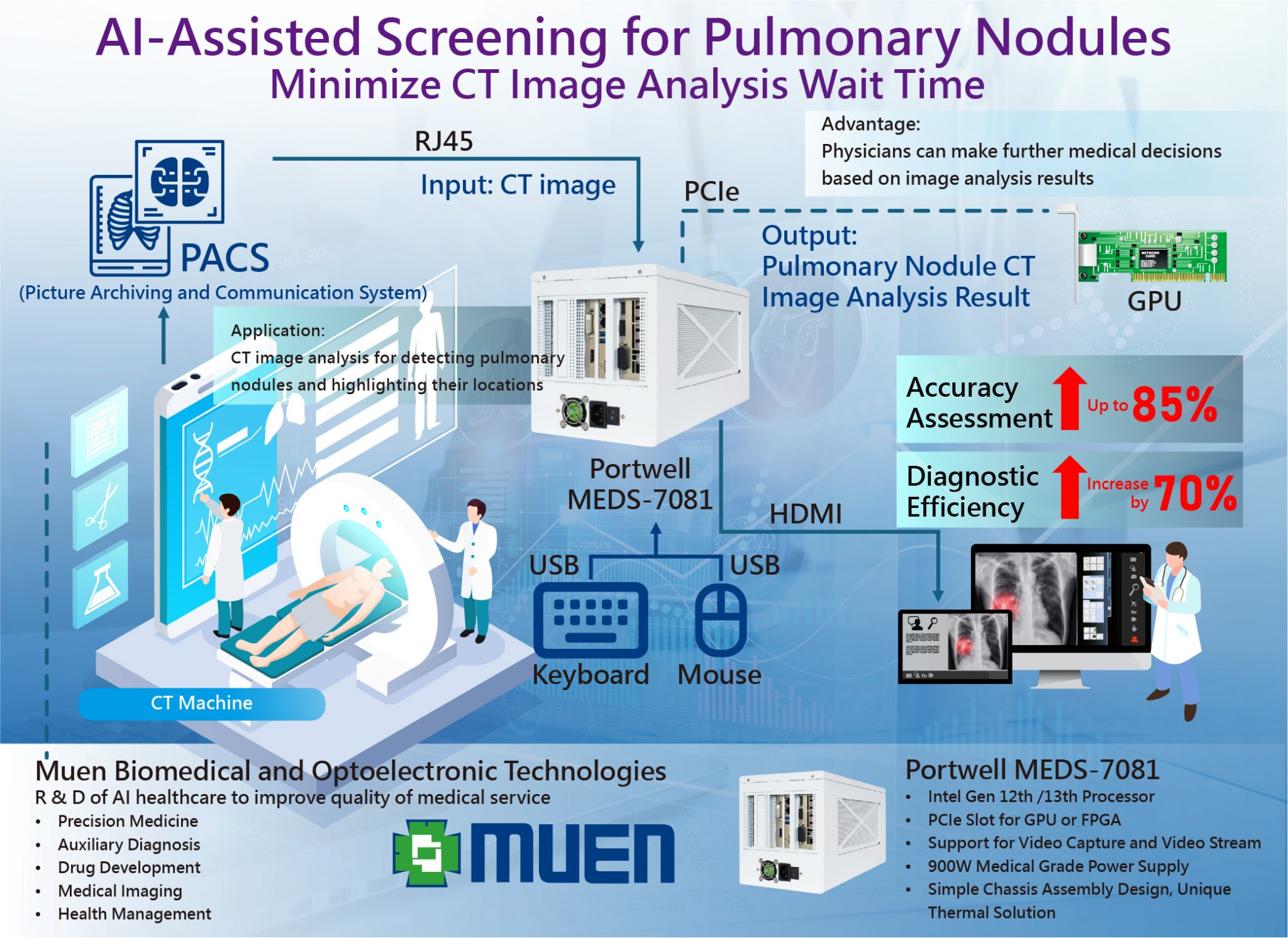
Pulmonary nodule screening is a critical method for early lung cancer diagnosis. However, medical institutions continue to face numerous challenges when analyzing CT images. Traditionally, doctors retrieve lung CT scan images through the PACS (Picture Archiving and Communication System) and rely on their expertise to interpret and mark suspicious nodules. This manual interpretation demands a high level of professional experience, yet the number of seasoned radiologists remains limited, straining healthcare resources.
Moreover, the process of reviewing CT images is highly time-consuming, requiring physicians to inspect each frame manually and mark potential lesions, significantly reducing diagnostic efficiency and prolonging patient wait times. Additionally, subjective human interpretation may lead to misdiagnoses due to fatigue or poor image quality, even among experienced doctors. These limitations in traditional imaging workflows not only impact screening efficiency but also compromise diagnostic accuracy, increasing the risk of misdiagnosis or delayed treatment. Given these challenges, the integration of edge AI technology has emerged as a transformative solution in medical imaging interpretation.
Edge AI is proving to be a game-changer in the smart healthcare sector, particularly in pulmonary CT image screening. By leveraging high-performance GPUs, edge AI systems can accelerate image analysis and streamline diagnostic processes. Take the MEDS-7081, a medical-grade edge AI system, as an example. This advanced system delivers high AI computational power (TOPS) to rapidly analyze lung CT images, swiftly detecting and marking pulmonary nodules.
This technological advantage not only aids radiologists in efficiently screening abnormal lung conditions but also enhances the accuracy of medical image analysis. By adopting edge AI systems, physicians can significantly reduce the time spent on image screening, allowing them to focus on clinical decision-making and more in-depth medical diagnostics. Clinical studies show that AI-assisted screening improves diagnostic efficiency by 70% while achieving an accuracy rate of over 85% in pulmonary nodule detection. This marks a significant leap in both efficiency and precision for medical imaging interpretation.
Designed specifically for medical image processing and AI computing, the MEDS-7081 boasts a high-performance hardware architecture capable of swiftly handling CT image data and providing real-time analysis. Equipped with Intel 12th/13th Gen processors, the system ensures powerful data processing capabilities. Additionally, it supports PCIe expansion slots for GPU acceleration modules, enabling efficient analysis of pulmonary CT scans.
To ensure stable operation in medical environments, the MEDS-7081 is equipped with a 900W medical-grade power supply, capable of sustaining AI computation, image processing, and peripheral device control under high workloads. This guarantees smooth operation while maintaining system stability and security. Furthermore, the system supports high-performance image capture and streaming technologies, ensuring seamless medical imaging workflows and improving diagnostic efficiency for healthcare professionals.
From a design perspective, the MEDS-7081 features a modular chassis and advanced thermal management solutions, ensuring stable operation even under intense computational loads. This makes it highly reliable for medical applications, meeting the stringent demands of healthcare environments.
As AI technology continues to evolve, the future of medical imaging analysis is set to become more precise and efficient. The adoption of the MEDS-7081 edge AI system enables healthcare institutions to significantly improve the efficiency and accuracy of pulmonary CT screenings without disrupting existing workflows, bringing the vision of smart healthcare closer to reality.
Furthermore, this advancement presents new market opportunities for the industrial PC industry in the smart healthcare sector, driving medical technology innovation and delivering more accurate and efficient diagnostic services to patients worldwide.
Through its DMS (Design, Manufacturing, Service) solutions, Portwell offers comprehensive product development and system integration support, enabling customers to rapidly deploy and optimize their AI-driven applications. Our dedicated R&D team customizes hardware and firmware solutions tailored to diverse industry needs, ensuring superior system performance.
By leveraging high-quality manufacturing processes, Portwell guarantees stable and reliable device operation, even in harsh industrial environments. Additionally, we provide end-to-end technical support, including remote diagnostics, system maintenance, and software updates, ensuring long-term system efficiency.
With DMS services, Portwell delivers innovative hardware solutions that empower customers in the smart healthcare domain, enabling high-efficiency, stable and flexible AI applications that create greater market value.
To provide the best experiences, we and our partners use technologies like cookies to store and/or access device information. Consenting to these technologies will allow us and our partners to process personal data such as browsing behavior or unique IDs on this site and show (non-) personalized ads. Not consenting or withdrawing consent, may adversely affect certain features and functions.
Click below to consent to the above or make granular choices. Your choices will be applied to this site only. You can change your settings at any time, including withdrawing your consent, by using the toggles on the Cookie Policy, or by clicking on the manage consent button at the bottom of the screen.